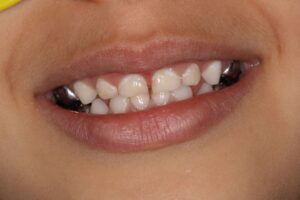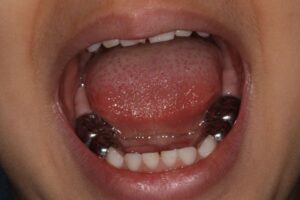Centre dentaire Pédiatrique & prosthodontique de Montréal
Patient zone
First visit form
When you come in for your first appointment, you will have to fill out a form giving us all the relevant information on your health. To speed things up, please fill out the form ahead of time and send it to us on line or print it and bring it with you. Rest assured that all information will remain confidential.
Appointment cancellations must be made by telephone or e-mail at least 48 hours in advance or a service charge will apply.
Minor oral surgery
Some dental treatments may be covered by your insurance plan. Please bring your forms or identity card with you to your appointment. We would be pleased to submit your insurance claims to participating companies.
It is important to follow the instructions below to speed healing. Note that some discomfort and swelling are normal after surgery
Day of surgery
- Keep the compresses in your mouth for one to two hours, applying firm pressure. Change the pads every half hour, as needed.
- Apply ice to your cheek at regular intervals (20 minutes of ice every hour).
- If bleeding occurs, bite down on a gauze pad or lightly moistened tea bag for 20 minutes.
Don’ts
- Don’t rinse your mouth or spit.
- Don’t drink through a straw.
- Don’t smoke.
- Don’t consume hot foods or beverages. Eat cold, soft foods.
- Don’t engage in intense activity.
Pain
- For pain relief in the first 24 to 72 hours, take acetaminophen (Tylenol, Atasol), ibuprofen (Motrin, Advil) or the medication you were prescribed. Don’t take aspirin.
The day after until full healing
- Rinse your mouth three times a day with a warm salt water solution (2 ml or ½ tsp of salt in 250 ml or 1 cup of water).
- There may be some bruising on the skin. This will disappear in five to seven days.
- You may have trouble opening your mouth. This should diminish in four to five days.
- If the pain increases after three days, call our office.
You will feel better after a few days and can resume your normal activities. If you experience heavy bleeding, pain, continued swelling for two to three days or a negative reaction to the medication, call us at 514.270.2927.
Tooth extraction
It is important to follow the instructions below to speed healing. Note that some discomfort and swelling are normal after surgery.
Day of surgery
- Keep the compresses in your mouth for one to two hours, applying firm pressure. Change the pads every half hour, as needed.
- Keep your head elevated at all times.
- Apply ice to your cheek at regular intervals (20 minutes of ice every hour).
- If bleeding occurs, bite down on a gauze pad or lightly moistened tea bag for 20 minutes.
- Bleeding and coloured saliva are normal postoperative effects.
- Limit your physical activity. Rest.
Don’ts
- Don’t dislodge the blood clot that has formed as it helps with the healing process.
- Don’t eat anything before the bleeding stops.
- Don’t drink through a straw.
- Don’t rinse your mouth or spit.
- Don’t smoke or drink alcohol.
- Don’t eat hard foods.
- Don’t brush near the area of the extracted tooth for the first 72 hours.
Pain
- If the pain causes you discomfort, take the medication you were prescribed.
- If you were prescribed antibiotics for this treatment, continue to take them for the specified time period even if the symptoms are gone.
Food
- Eat only soft foods or lukewarm liquids the day of the extraction. Resume your normal eating habits as soon as you are able.
The day after until full healing
- Rinse your mouth three times a day with a warm salt water solution (2 ml or ½ tsp of salt in 250 ml or 1 cup of water).
- Brush your teeth and floss daily to remove plaque and ensure the best long-term results. Don’t brush near the area of the extracted tooth for the first 72 hours.
- Avoid hard foods (nuts, candy, ice).
- You may have trouble speaking and produce extra saliva. This should subside in a week.
- There may be some bruising on the skin. This will disappear in five to seven days.
- You may have trouble opening your mouth. This should diminish in four to five days.
- If the pain increases after three days, call our office.
You will feel better after a few days and can resume your normal activities. If you experience heavy bleeding, pain, continued swelling for two to three days or a negative reaction to the medication, call us at 514.270.2927.
Stainless steel crowns
Stainless steel crowns offer several advantages in dentistry. Here are some of their benefits:
Durability: Stainless steel crowns are extremely durable. They are less likely to break or crack compared to some other treatments like silver or white fillings.
Corrosion Resistance: Stainless steel is corrosion-resistant, meaning it does not rust. This ensures a long lifespan for the crown.
Biocompatibility: Stainless steel is generally well-tolerated by oral tissues, reducing the risk of allergic reactions or irritations.
Ease of Maintenance: Stainless steel crowns are easy to maintain. Maintaining good oral hygiene is usually sufficient to preserve them.
Protection Against Decay: Stainless steel crowns adequately protect teeth against recurrent cavities because they cover all surfaces of the tooth.



